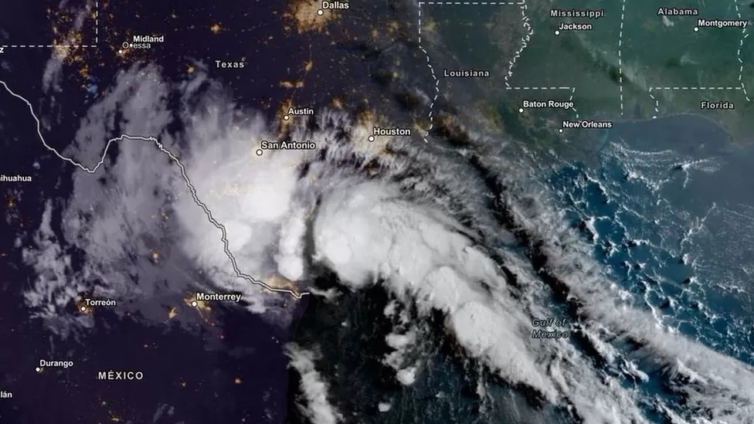
Audio By Carbonatix
Tropical Storm Harold made landfall on the south-east coast of Texas on Tuesday, bringing more heavy rain and high winds to the southern US.
The storm has dumped up to 7in (17.7cm) of rain in some parts of the state.
By late Tuesday afternoon, the storm had been downgraded to a tropical depression, but heavy rains continued.
More than 23,000 people were without power in the Lone Star state on Tuesday night.
The Texas deluge arrived a day after historic amounts of rain flooded parts of the south-western US.
California and Nevada were cleaning up on Tuesday after seeing historic amounts of rain from Storm Hilary, which caused widespread flooding.
Tropical Storm Harold made landfall on Tuesday morning local time on Texas' Padre Island in the Gulf of Mexico.
Tropical storm warnings had been issued from the Rio Grande river - along the state's southern boundary - to roughly 250 miles (400km) north, to the community of Port O'Connor.
Scattered instances of flash flooding were still a threat, the NWS warned.
Texas Governor Greg Abbott said the state had deployed emergency resources including rescue boats, search-and-rescue teams and platoons from the state National Guard.
Wind gusts of 59 mph were reported outside of Corpus Christi.
The storm was expected to continue to carry rain, wind and hail farther inland as it tracks westward across the hot and dry Texas landscape.
Rain was expected to taper off on Wednesday.
As Texans endure the deluge, weather officials have warned of yet another tropical storm - Franklin - currently some 230 miles east off the coast of the Dominican Republican.
Up to 6in of rain from Franklin is predicted to fall in Puerto Rico from Wednesday.
The impact of climate change on the frequency of storms is still unclear, but we know that increased sea surface temperatures warm the air above and make more energy available to drive hurricanes, cyclones and typhoons. As a result, they are likely to be more intense with more extreme rainfall.
The world has already warmed by about 1.1C since the industrial era began and temperatures will keep rising unless governments around the world make steep cuts to emissions.
Latest Stories
-
Adom FM’s ‘Strictly Highlife’ lights up La Palm with rhythm and nostalgia in unforgettable experience
27 minutes -
Ghana is rising again – Mahama declares
5 hours -
Firefighters subdue blaze at Accra’s Tudu, officials warn of busy fire season ahead
6 hours -
New Year’s Luv FM Family Party in the park ends in grand style at Rattray park
6 hours -
Mahama targets digital schools, universal healthcare, and food self-sufficiency in 2026
6 hours -
Ghana’s global image boosted by our world-acclaimed reset agenda – Mahama
6 hours -
Full text: Mahama’s New Year message to the nation
6 hours -
The foundation is laid; now we accelerate and expand in 2026 – Mahama
7 hours -
There is no NPP, CPP nor NDC Ghana, only one Ghana – Mahama
7 hours -
Eduwatch praises education financing gains but warns delays, teacher gaps could derail reforms
7 hours -
Kusaal Wikimedians take local language online in 14-day digital campaign
8 hours -
Stop interfering in each other’s roles – Bole-Bamboi MP appeals to traditional rulers for peace
8 hours -
Playback: President Mahama addresses the nation in New Year message
8 hours -
Industrial and Commercial Workers’ Union call for strong work ethics, economic participation in 2026 new year message
10 hours -
Crossover Joy: Churches in Ghana welcome 2026 with fire and faith
10 hours

